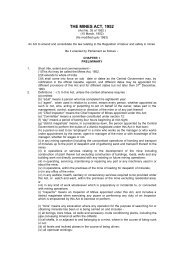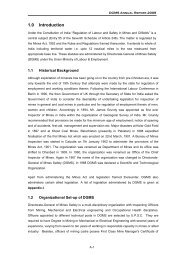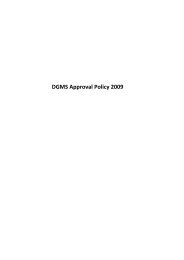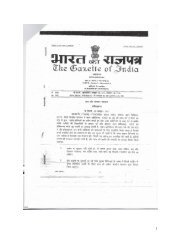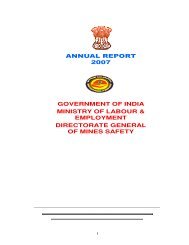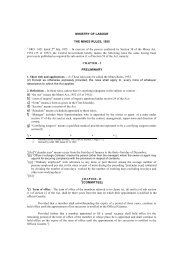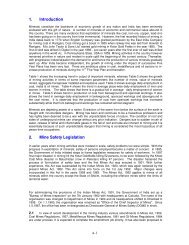India - Constitution - Directorate General of Mines Safety
India - Constitution - Directorate General of Mines Safety
India - Constitution - Directorate General of Mines Safety
You also want an ePaper? Increase the reach of your titles
YUMPU automatically turns print PDFs into web optimized ePapers that Google loves.
equiring special knowledge <strong>of</strong> law after he became anadvocate;(b) in computing the period during which a person has heldjudicial <strong>of</strong>fice in the territory <strong>of</strong> <strong>India</strong> or been an advocate <strong>of</strong> aHigh Court, there shall be included any period before thecommencement <strong>of</strong> this <strong>Constitution</strong> during which he has heldjudicial <strong>of</strong>fice in any area which was comprised before thefifteenth day <strong>of</strong> August, 1947, within <strong>India</strong> as defined by theGovernment <strong>of</strong> <strong>India</strong> Act, 1935, or has been an advocate <strong>of</strong> anyHigh Court in any such area, as the case may be.(3) If any question arises as to the age <strong>of</strong> a Judge <strong>of</strong> a HighCourt, the question shall be decided by the President afterconsultation with the Chief Justice <strong>of</strong> <strong>India</strong> and the decision <strong>of</strong>the President shall be final.Article 218 Application <strong>of</strong> certain provisions relating toSupreme Court to High CourtsThe provisions <strong>of</strong> clauses (4) and (5) <strong>of</strong> article 124 shall applyin relation to a High Court as they apply in relation to theSupreme Court with the substitution <strong>of</strong> references to the HighCourt for references to the Supreme Court.Article 219 Oath or affirmation by Judges <strong>of</strong> High CourtsEvery person appointed to be a Judge <strong>of</strong> a High Court shall,before he enters upon his <strong>of</strong>fice, make and subscribe beforethe Governor <strong>of</strong> the State, or some person appointed in thatbehalf by him an oath or affirmation according to the form setout for the purpose in the Third Schedule.Article 220 Restriction on practice after being a permanentJudgeNo person who, after the commencement <strong>of</strong> this <strong>Constitution</strong>,has held <strong>of</strong>fice as a permanent Judge <strong>of</strong> a High Court shallplead or act in any court or before any authority in <strong>India</strong> exceptthe Supreme Court and the other High Courts.Explanation: In this article, the expression "High Court" doesnot include a High Court for a State specified in Part B <strong>of</strong> theFirst Schedule as it existed before the commencement <strong>of</strong> the<strong>Constitution</strong> (Seventh Amendment) Act, 1956.Article 221 Salaries, etc., <strong>of</strong> Judges(1) There shall be paid to the Judges <strong>of</strong> each High Court suchsalaries as may be determined by Parliament by law and, untilprovision in that behalf is so made, such salaries as arespecified in the Second Schedule.(2) Every Judge shall be entitled to such allowances and tosuch rights in respect <strong>of</strong> leave <strong>of</strong> absence and pension as mayfrom time to time be determined by or under law made byParliament and, until so determined, to such allowances andrights as are specified in the Second Schedule:Provided that neither the allowances <strong>of</strong> a Judge nor his rights inrespect <strong>of</strong> leave <strong>of</strong> absence or pension shall be varied to hisdisadvantage after his appointment.Article 222 Transfer <strong>of</strong> a Judge from one High Court to another(1) The President May, after consultation with the Chief Justice





